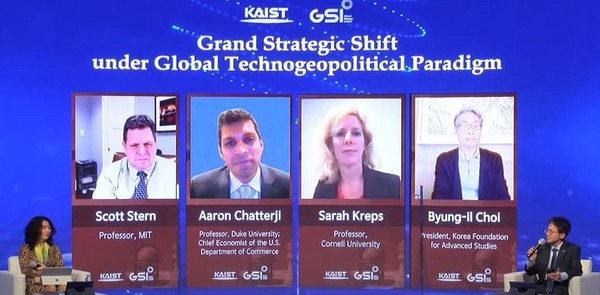On October 28, The KAIST Global Strategy Institute hosted its 5th International Forum (GSI-IF). The forum, titled “Grand Strategic Shift under Global Techno-Geopolitical Paradigm”, revolved around strategies for rebuilding the global economy in the post-pandemic era through innovations in science and technology. The speakers discussed the means to enhance the resiliency of the global supply chain, the new geopolitical power dynamics, and Korea’s place in the technology race. The forum was live-streamed on YouTube and KTV.
The event commenced with the opening speech by KAIST President Kwang Hyung Lee, followed by Prime Minister Boo Kyum Kim and Vice Minister of Science and ICT Hongtaek Yong’s congratulatory remarks. In his speech, President Lee stressed the importance of technological sovereignty in a world so heavily reliant on technology, stating that the economical and political leaders of the future are those countries that can innovate.
Three professors from world-renowned institutions were invited as guest speakers for the first keynote session: Professor Scott Stern from the MIT Sloan School of Management, Professor Aaron Chatterji from the Fuqua School of Business at Duke University, and Professor Sarah Kreps from the Department of Government at Cornell University. Professor Stern shared a number of general purpose technologies (GPTs) that can have a significant ripple effect on the global economy over the next 20 years, while Professors Chatterji and Kreps discussed the ongoing competition for technological hegemony between the US and China, and the direction Korea should take amidst this conflict. After the professors’ presentations, a panel discussion was held.

The speakers at the second session were SK Group Chairperson Tae-Won Chey, President Woo Il Lee of the Korean Federation of Science and Technology Societies, Professor Young Kwan Yoon at Seoul National University, President Eun Mee Kim of Ewha Womans University, and President Leehwan Kim of the University of Science and Technology. All of the speakers stressed the importance of innovation in science and technology and its effective translation into national strategic leadership as means to flourishing in the new industrial paradigm. They agreed to make prompt innovations and build solid collaborative systems among universities, the industry, and the government to ensure national technological competitiveness.

